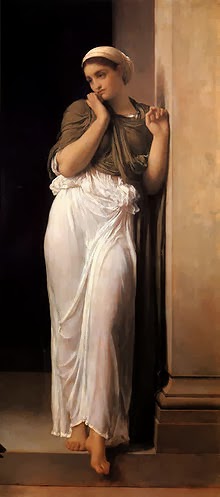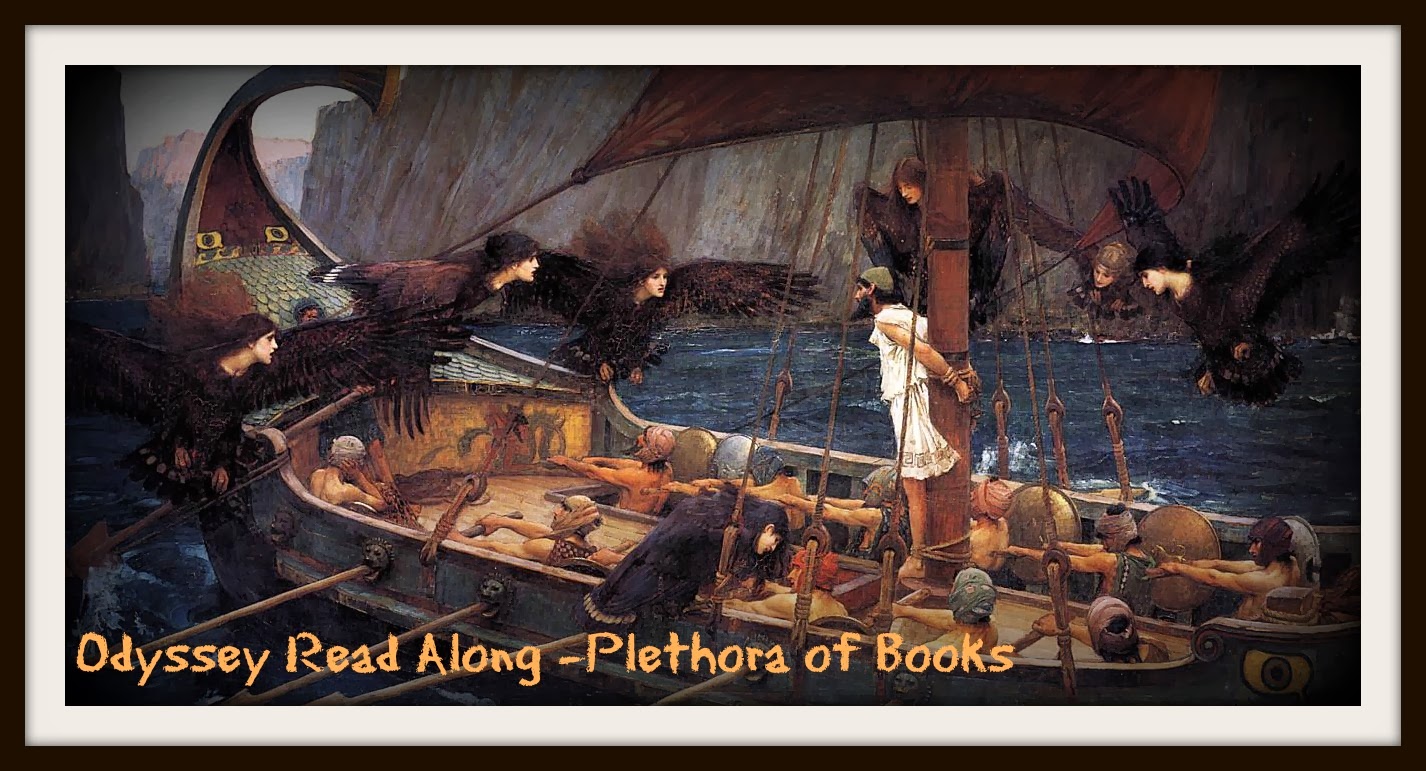The Odyssey Read-Along @ Plethora of Books
Book VII
Silver-Tongued Odysseus
In the previous chapter, Odysseus charmed Nausikaa with his gallant words, causing her to wish for him as a husband over all Phaiakians, even though he is a foreigner in their land. When he meets Alkinoös and Arete, he must take even greater care because he had earlier met their daughter, causing her to make “friends with a man without being formally married.” Yet Odysseus tells them the truth, while sweetening his words with an irresistible charm that does not fail to enchant the king and queen. The king offers Nausikaa’s hand in marriage, along with property and respect among the people
Identity & Crafty-Odysseus
Odysseus has yet to reveal his identity. I wonder why he feels the need to conceal himself. He also cleverly avoids answering Alkinoös’ offer of his daughter.
Themes:
- the divinity of Phaiakia
- the Phaiakian love of ships
- the Phaiakian’s knowledge of right and wrong
- Athene’s continuing care of Odysseus
 |
| Odysseus at the Palace of Alkinoös Francesco Hayez (1814 – 1815) source Wikipedia |
Book VIII
Alkinoös takes Odysseus to an assembly and Athene, this time in the guise of a man, goes throughout the city encouraging people to come to learn about the stranger. Alkinoös counsels the people to help Odysseus on his journey, and then calls for Demodokos, the singer, upon whom the Muse had visited both good and evil, removing his sight but gifting him with a sweet singing voice (is he modelled after Homer?). He sings of the quarrel between Odysseus and Peleus’ son, Achilles, and how great Agamemnon was pleased, for the prophecy Apollo had spoken to him was fulfilled, signifying the beginning of evil for the Trojans. Odysseus weeps uncontrollably, burying his head in his mantle and it seems Alkinoös understands his anguish. He suggests that they have fulfilled their desire for lyre and feasting and now they should have contests to test speed and strength, so Odysseus can recount their prowess when he returns home. Laodamas, son of Alkinoös, at Euryalos’ urging, challenges Odysseus, who is offended at his intemperate words. When Euryalos further angers him, he becomes rather heated and defends himself:
“Friend, that was not well-spoken; you seem like one who is reckless.
So it is that the gods do not bestow graces in all ways
on men, neither in stature nor yet in brains or eloquence;
for there is a certain kind of man, less noted for beauty,
but the god puts comeliness on his words, and they who look toward him
are filled with joy at the sight, and he speaks to them without faltering
in winning modesty, and shines among those who are gathered,
and people look on him as on a god when he walks in the city.
Another again in his appearance is like the immortals,
but upon his words there is not grace distilled, as in your case
the appearance is conspicuous, and not a god even
would make it otherwise, and yet the mind there is worthless.
Now you have stirred up anger deep in the breast within me
by this disorderly speaking …….” (166 – 179)
Rising, he grabs a discus and far out throws anyone who has yet competed. He then boasts of other feats he is capable of, and mentions the Trojan country where he was; when he finishes his speech, all men are “stricken to silence.” To lower the tension, Alkinoös suggests dancing with more story-telling, and Odysseus watches the performance, at the end conceding the superiority of their dancers with an eloquence and diplomacy that wins admiration. Alkinoös promises gifts to Odysseus, and even Euryalos gives him a sword. Nausikaa reminds him of her rescue of him, and wishes for his kind thoughts of her in his homeland, whereupon he charms her again with words and finally he offers Demodokos the best portion of his meat. The singer, pleased, begins to sing of the Argives and their means of gaining the inner city of Troy inside the Trojan horse. Once more Odysseus sobs his heart out in sorrow, and Alkinoös, watching, finally directly asks for his history.
Fame and Glory
The Phaiakians were looking to win the admiration of Odysseus with their contests but, when it becomes apparent he can best them at most sport, they then turn to dancing, an area in which they prove their supremacy. They want him to carry home a tale of an exploit in which they could impress foreigners.
Identity
Still Odysseus conceals his identity and, instead, strategically employs diplomatic and persuasive speech to win their respect. His survival, in this case, perhaps does not depend on weapons, but tact and ingenuity. His politeness reflects much more on his character than actions. After hearing the Phaiakian songs of the Trojan War sung by Demodokos, will Odysseus feel more comfortable with revealing himself?
The Phaiakians
These are a curious people and are difficult to characterize. Their kingdom is far away from others, and they do not seem to welcome strangers in the same manner as other countries. They are not completely unsophisticated, yet there are clues that they are not as advanced as other nations. A prime example of this is when Euryalos almost apologizes for his gift sword being merely made of bronze, but then points out that the handle is silver and the scabbard of ivory. Could their possible inferiority also be the reason that they want Odysseus to carry home a story of their aptitude and excellence in a respected arena, such as sports or dancing?
 |
| Nausicaa Frederic Layton (1878) source Wikipedia |



I love this! I read the Odyssey and the Illiad before I started blogging, but like with all epic poems I think I read it too fast and only skimmed the surface. I like how you are breaking it down by Book – fascinating!
-Dale
Thanks! With this second read I'm certainly picking up more of the themes and the subtleties of the poem. I do have intentions of making my posts shorter but Homer packs so much into each book and I find I like to get my thoughts out for myself, to better appreciate the poem.
Thanks for reading! 🙂
I love your Odysseus posts! I always go back to the book to reread the parts I feel I overlooked 🙂
I had a wonderful group to help me the first time I read The Iliad and The Odyssey, so now I'm so glad I can be helpful to you!
Yes, this shorter post hasn't panned out for me either. Even with as long my post have been I still end up leaving things out or wishing I had expanded my thoughts more. Oh well, I do still need to find time to actually read. ;O
I was going to try to shorten the posts but I figure that it's good information to have if you ever study the book in a book group; it's good reference material, it's handy and it's certainly very detailed! 😉